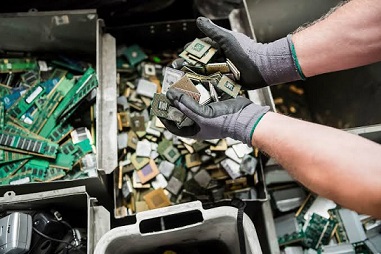
info.afrindex.com
China-Africa Trade Information Service

info.afrindex.com
China-Africa Trade Information Service

Image from 90.5 WESA
The Nigerian government is working with the Global Environment Facility (GEF) and the United Nations Environment Ministry to develop a circular economy for electronic products in Nigeria.
The $15-million (£12-million) initiative aims to put an end to the improper management of electronic waste in the country, bringing together players from government, the private sector and civil society.
The project will promote the recycling of usable electronic components, whilst also developing systems for the disposal of non-usable and toxic waste. It aims to collect, treat and dispose of more than 270 tonnes of e-waste contaminated with persistent organic pollutants (POPs, chemicals that accumulate rather than degrade in nature) and 30 tonnes of mercury-containing waste.
Speaking at the launch last month, Mrs Ibukun Odusote, Permanent Secretary of the Ministry of the Environment, noted that the project would support the E-waste Producers Responsibility Organisation (EPRON) – a key initiative from the Nigerian Government to promote sustainable production and consumption by encouraging producers to take responsibility for the entire lifecycle of their products.
A UN report, published in February, highlighted the extent of the problem, revealing that 50 million tonnes of e-waste is produced each year. The report outlined that, globally, an average of 20 per cent of e-waste is reported as properly collected and recycled, leaving the remaining 80 per cent undocumented – much of it is either dumped in landfill or processed in informal recycling sites.
Large-scale shipments of electronic waste from the United States and Europe are sent to Africa, with high volumes going to Ghana, Cote D'Ivoire and the Republic of the Congo. Nigeria deals with over 1.1 million tonnes of e-waste every year, from both local and imported electrical items.
According to the International Labour Organisation, up to 100,000 people work in the informal e-waste recycling sector in Nigeria. These workers commonly suffer respiratory and dermatological problems, as well as eye infections and lower than average life expectancy, as a result of direct exposure to hazardous chemicals.
Although WEEE can be dangerous, it also presents an economic opportunity. With the UN report revealing that seven per cent of the world’s gold may currently be contained in e-waste, a safe and efficient circular electronics system could prove a fruitful investment.
Nigeria has already been taking steps to deal with its excess of e-waste, with an investment of $2 million (£1.53m) to boost WEEE recycling announced in February this year, coinciding with the UN report.